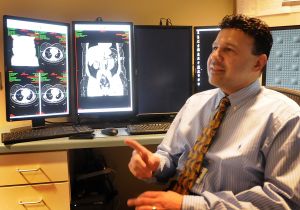
Farid Shafaie, M.D. and Chairman of The Radiology Department at Presence Health St. Mary’s Hospital
By Dennis Yohnka, Reprinted Courtesy of The Daily Journal Kankankee IL
Maybe the world is missing important breakthroughs in philosophy, home water softening systems, NASA projects and other endeavors. But some area patients are grateful today that career paths were altered for a few area doctors — who hadn’t always planned to spend a lifetime in medicine.
So — as Americans observe National Doctors’ Day on March 30 — there are some would-be lawyers, engineers and other professionals who will be honored, because their plans changed along the way. This special day first was celebrated in 1933, when it was more like a mini-Memorial Day. Patients would decorate the graves of deceased physicians. Congress officially recognized the day in 1990, with the focus gradually shifted to greeting cards and small gifts for the doctors still with us.
But joining the ranks of the medical community wasn’t always in the cards for some area physicians.
In fact, Dr. Ray Dieter III, a cardiologist from Chebanse, didn’t even plan to attend college. “I graduated from Central High School in the spring, and all summer I was selling Culligan [water softening systems] for my dad,” the Chicago area practitioner said. “Then, one day in the fall, my mother woke me up and said: ‘You’re going to the University of Illinois today.’ “She said she arranged for my admission, and that was it. I should pack some clothes and go study to be a doctor,” he said. “I didn’t fight the idea. I liked my science classes. But I really thought I was going to work with dad.”
Dr. Farid Shafaie, a radiologist at Presence St. Mary’s Hospital, took his alternate career path a little further. “I graduated from high school at 15 and then got my bachelor’s in mechanical engineering, but I was only 19, so I stayed for a master’s in engineering, with a minor in computer science,” he said. “I got a job in engineering and worked on everything from building plans to NASA projects. “But a lot of people in my family were in health care, so I asked myself if I could combine my interests. I went to a medical school and talked about how I could maybe pull in my technical expertise.” He found radiology and now recognizes how the use of computers is changing the face of medicine.
Dr. Stephen Hermes, a geriatric specialist with a busy practice in Bradley, was planning on going to college but was focused on his philosophy major. “I studied at Notre Dame and Emory University [in Atlanta], and I was focused on the mind-body relationship,” he said. “Along the way, I realized the balance I wanted in my life.” Before he could act on his fresh understanding, Uncle Sam called. Hermes was drafted in the midst of the Vietnam War. “I served [not in Vietnam] from 1969 to 1971. I was a conscientious objector,” he explained. “So, they put me in the Army’s medical service — and when I got out, I decided to stay in medicine. I had to complete [prerequisite courses in] chemistry, but I was admitted in the Loyola University School of Medicine. “The Holy Spirit led me. I found the right fit,” he added. The contrast is just as obvious for Dr. Joseph Pigato, a Kankakee-based urologist. His plan was to join the Air Force and become a fighter pilot, instead he’s blasting kidney stones these days. “I came very close to enrolling at the Air Force Academy,” he explained of his post high school plans. “I had the endorsement from my congressman. I was ready.” He recalls two factors that changed his career’s direction. He spent a day with a doctor and saw the satisfaction he gained working with his patients. “And I remembered when I had an emergency appendectomy. It was bad. My mother told me I only had a 50-50 chance,” he said. “When I came through, I never forgot that [medicine] saved my life.”

